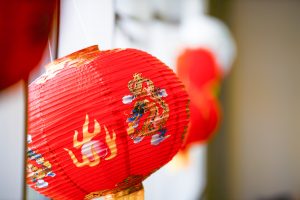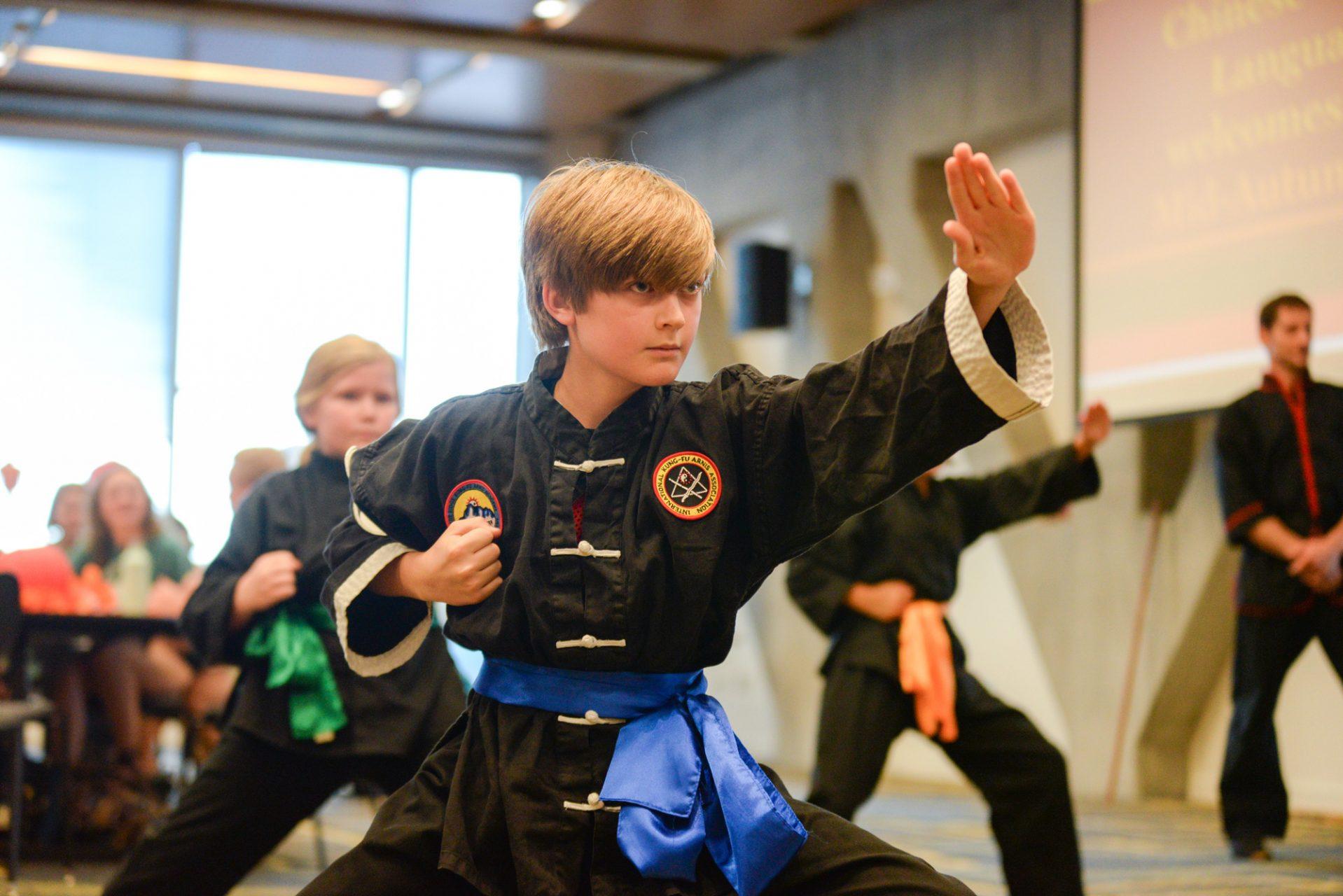Lured in by the smell of free Chinese food, students gathered in the Parkway Ballroom on Sept. 26 to partake in the Chinese Culture Club’s annual Mid-Autumn Festival.
Each year, Chinese Culture Club connects with organizations across campus and the community to offer a festival that not only has free food and entertainment, but also educates students about Chinese culture.
This year, the festival featured catering from China Wok, readings of Chinese stories and poetry, demonstrations by a local kung fu academy and performances from three a capella groups: VoiceMale, Enharmonix and Strong Ties.
Though most of the festival was spent partaking in the food and music, the club made sure that visitors left with new knowledge about China and the Mid-Autumn Festival. Featured at the festival was professor Cuong Mai, who shared myths about the origins of the festival through humorous stories, and professor Jeffrey Eastman, who read ancient Chinese poetry with international student Yao Shubin.
The Mid-Autumn Festival, which occurs on the 15th day of the eighth month of the lunar calendar, celebrates the harvest, the union of families and the full moon.
In one variation of Chinese myth, the festival originated to honor Chang’e, the wife of warrior Hou Yi. Long ago, China was plagued by a famine; there were 10 suns in the sky and their combined intensity killed the crops and starved the people. In an effort to save his people, Hou Yi shot nine suns out of the sky with his bow and arrow, leaving the 10th to give his people warmth and light.
Hou Yi was considered a hero and rewarded with the elixir of immortality which he gave to his wife to protect. When a burglar tried to steal the elixir, his wife drank it herself to keep it out of the hands of the thief. As the potion took effect, Chang’e gained immortality but floated away to the moon, forever out of her husband’s reach. Lamenting the loss of his wife, Hou Yi left offerings of mooncakes and fruit in his wife’s honor, the same foods families use as offerings during the festival today.

Today, partakers in China celebrate with mooncakes, paper lanterns and traditional dragon dances. Here in Boone, the Chinese Culture Club celebrates with a night full of takeout, music and storytelling.
Club president Eli Schwarz said that the opportunity to share culture is the most valuable part of the festival. Despite China’s massive population and influence, Schwarz said he felt that many Americans know little to nothing about Chinese culture.
“Even if people only learn one new thing at the festival,” Schwarz said, “we’ll consider that a success.”
Schwarz, a junior accounting and international business major, has been with the club since freshman year, climbing up the ladder from club member to secretary and now to president. Schwarz studied abroad in China during high school, developing a deep appreciation for the culture before deciding to pursue the language more thoroughly.
This semester is both his first and last semester as president; next semester he will be returning to study abroad in China and handing his position off to vice president Jenny Moerk.
Moerk, a sophomore computer information systems and international business major, joined the club her freshman year as well. Moerk had taken Chinese through high school, taking twice the necessary classes needed to graduate, and is pursuing a Chinese minor at Appalachian State to further her grasp of the language.
Every Wednesday, Schwarz and Moerk lead club meetings in the Plemmons Student Union. Most nights, the club members exchange presentations on aspects of culture and society in China. Other nights, they explore Chinese culture hands-on, making homemade hot pots and watching Chinese movies.

Most members of the club have at least one common goal: an interest in learning Chinese. Whether majoring, minoring or simply taking courses to meet general education requirements in Chinese, many of the members are taking Chinese language classes.
While Chinese Culture Club was originally primarily a place to learn about Chinese culture and society, this year there is an added emphasis on language to better match the club’s needs.
The club works with professors’ and students’ schedules to transform into a large study group before Chinese classes’ tests and exams. Club members study for classes together, but also take the time to learn new words together at each meeting.
Like many Chinese language courses at Appalachian State, Chinese Culture Club uses a tool called pinyin to learn Chinese. In pinyin, Roman letters are assigned to Chinese characters, allowing learners to better associate Chinese characters with the sounds they represent.
For some club members, the interest in the club lies in connecting language back to its culture. Mesha Allen, a senior international business major and the treasurer of the Chinese Culture Club, said that when learning a new language, she first wants to understand the culture and community behind it.
Allen appreciates the ability to see the reality of a culture and wants to dig beyond media representations of Chinese society to uncover the gritty aspects of everyday life. Allen hopes to use her major and her growing understanding of Chinese culture to address the social issues Chinese citizens face.
Allen said that, as an international business major, “You have to find the problem, and then you find the solution that benefits you and the community.”
Though the Mid-Autumn Festival is over, the members of Chinese Culture Club are already busy at work planning the Chinese New Year Festival which they celebrate each February. Just as in the Mid-Autumn Festival, the club will collaborate with organizations on and around campus to combine the cultural awareness and education goals of the club with the food, music and entertainment that brings the festivals to life.
Story By: Ashley Goodman, Associate A&E Editor
Photos By: Maleek Loyd, Visual Managing Editor

